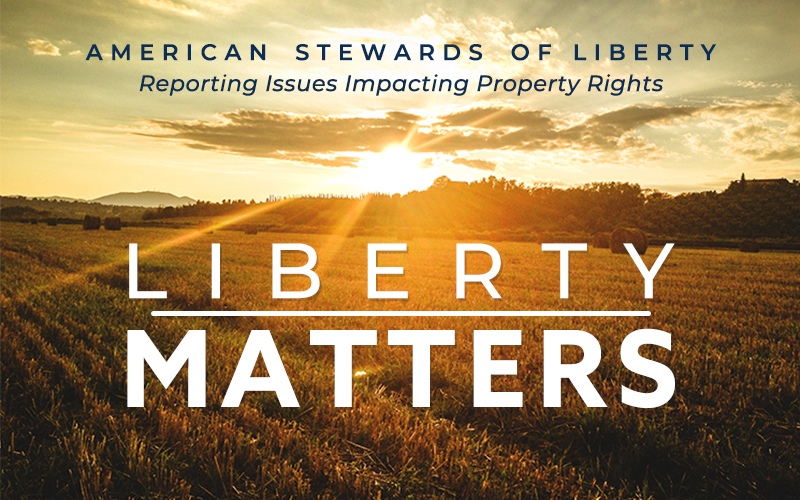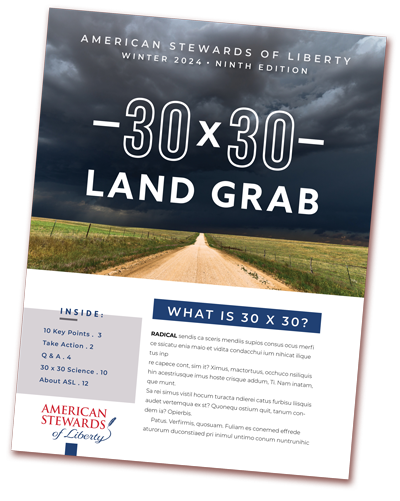In a win for America’s farmers and landowners, House Agriculture Committee Chairman, G.T. Thompson has taken a stand against the ever-expanding agendas of environmentalists. By rejecting language in the Inflation Reduction Act (IRA) from the current draft of the 2024 Farm Bill, Thompson is maintaining the bill’s focus on supporting agriculture rather than controlling it.
This approach is also a critical stand against the Biden Administration’s “30×30″ agenda, which seeks to place 30% of U.S. lands and waters under permanent government oversight by 2030.
However, it’s essential to recognize the significant changes the environmental lobby has made on other fronts. One of the most concerning developments is the expansion of Conservation Easement (CE) programs. The programs facilitate the creation of protected lands, and are a cornerstone of the 30×30 agenda.
Under the program, conservation easements on private lands are made permanent—they cannot be reversed, ever. This was a critical feature of the 30×30 strategy when it was launched in 2021.
Conservation easements in perpetuity transfer control of private land to the government or conservation organizations forever, often under the pretext of climate crisis management. Limiting these easements to a maximum term of 30 years would empower future generations to make their own decisions and reduce federal overreach.
Unfortunately, the current Farm bill grants more money and authority to conservation organizations to hold and manage easements. This shift incentivizes environmental groups to aggressively promote even more conservation easements to landowners. The result is a troubling imbalance: conservation organizations and the federal government gain more control over private property, while landowners find themselves increasingly marginalized.
These programs, originally intended to support good stewardship practices in agriculture, have morphed into subsidy programs that price out small, independent landowners, effectively transforming them into tenants on their own land.
To address these issues, several key recommendations should be adopted:
Rescind Instead of Repurpose Remaining IRA Conservation Program Funds: The remaining funds from the IRA should be rescinded rather than repurposed. The 2024 Farm Bill’s discussion draft, while rejecting the 30×30 language, still repurposes some of these funds, bloating already oversized programs. The funds should be eliminated to prevent further misuse under the 30×30 agenda.
Replace Permanent Conservation Easements with 30-Year Term Easements: Permanent conservation easements should be replaced with 30-year term easements. This would allow future generations to reassess and make decisions regarding the land’s use, ensuring that the current generation’s decisions do not bind them forever. The new Forest Reserve Easements and Forest Land Easements offer a 30-year term option, but restrict 10% of the funds for these termed easements. Removing this cap and applying the limit universally would be a common-sense reform.
Reduce Regional Conservation Partnership Program Funding: The funding for the Regional Conservation Partnership Program (RCPP), which has been dramatically increased by the IRA, should be reduced. The program provides grants to non-profit organizations for conservation activities, often leading to the erosion of local property rights and reduced agricultural productivity. Reducing the RCPP funds to $300 million or less annually would help keep these organizations in check, and prevent them from over-influencing local land use.
Finally, the RCPP has become a slush fund for environmental groups, using federal dollars to influence local governments and landowners. This undermines local autonomy, decreases land productivity, and increases dependency on federal subsidies.
It is imperative that we push back against these dangerous expansions and restore balance. By rescinding IRA funds, instituting term limits on easements, and reducing RCPP funding, we can protect property rights, ensure food security, and maintain the independence of America’s farmers and landowners.
Link to the article here.





